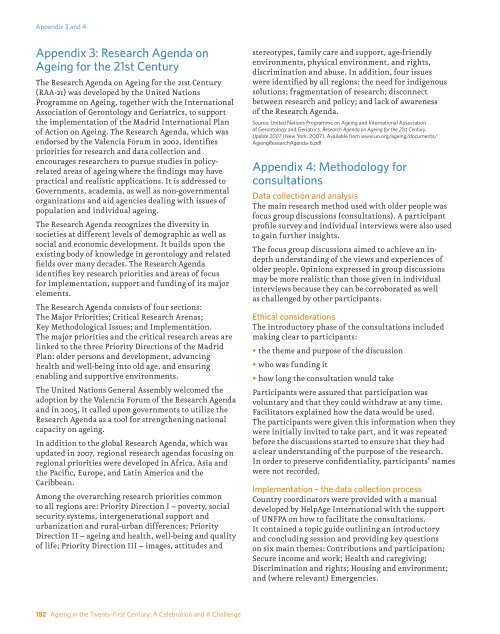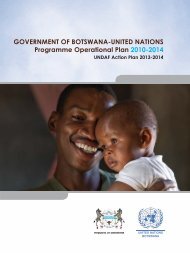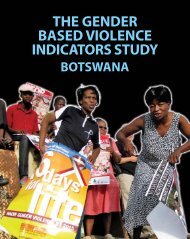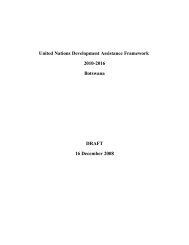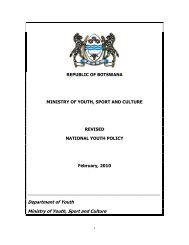Ageing in the Twenty-First Century: - HelpAge International
Ageing in the Twenty-First Century: - HelpAge International
Ageing in the Twenty-First Century: - HelpAge International
You also want an ePaper? Increase the reach of your titles
YUMPU automatically turns print PDFs into web optimized ePapers that Google loves.
Appendix 3 and 4<br />
Appendix 3: Research Agenda on<br />
<strong>Age<strong>in</strong>g</strong> for <strong>the</strong> 21st <strong>Century</strong><br />
The Research Agenda on <strong>Age<strong>in</strong>g</strong> for <strong>the</strong> 21st <strong>Century</strong><br />
(RAA-21) was developed by <strong>the</strong> United Nations<br />
Programme on <strong>Age<strong>in</strong>g</strong>, toge<strong>the</strong>r with <strong>the</strong> <strong>International</strong><br />
Association of Gerontology and Geriatrics, to support<br />
<strong>the</strong> implementation of <strong>the</strong> Madrid <strong>International</strong> Plan<br />
of Action on <strong>Age<strong>in</strong>g</strong>. The Research Agenda, which was<br />
endorsed by <strong>the</strong> Valencia Forum <strong>in</strong> 2002, identifies<br />
priorities for research and data collection and<br />
encourages researchers to pursue studies <strong>in</strong> policyrelated<br />
areas of age<strong>in</strong>g where <strong>the</strong> f<strong>in</strong>d<strong>in</strong>gs may have<br />
practical and realistic applications. It is addressed to<br />
Governments, academia, as well as non-governmental<br />
organizations and aid agencies deal<strong>in</strong>g with issues of<br />
population and <strong>in</strong>dividual age<strong>in</strong>g.<br />
The Research Agenda recognizes <strong>the</strong> diversity <strong>in</strong><br />
societies at different levels of demographic as well as<br />
social and economic development. It builds upon <strong>the</strong><br />
exist<strong>in</strong>g body of knowledge <strong>in</strong> gerontology and related<br />
fields over many decades. The Research Agenda<br />
identifies key research priorities and areas of focus<br />
for implementation, support and fund<strong>in</strong>g of its major<br />
elements.<br />
The Research Agenda consists of four sections:<br />
The Major Priorities; Critical Research Arenas;<br />
Key Methodological Issues; and Implementation.<br />
The major priorities and <strong>the</strong> critical research areas are<br />
l<strong>in</strong>ked to <strong>the</strong> three Priority Directions of <strong>the</strong> Madrid<br />
Plan: older persons and development, advanc<strong>in</strong>g<br />
health and well-be<strong>in</strong>g <strong>in</strong>to old age, and ensur<strong>in</strong>g<br />
enabl<strong>in</strong>g and supportive environments.<br />
The United Nations General Assembly welcomed <strong>the</strong><br />
adoption by <strong>the</strong> Valencia Forum of <strong>the</strong> Research Agenda<br />
and <strong>in</strong> 2005, it called upon governments to utilize <strong>the</strong><br />
Research Agenda as a tool for streng<strong>the</strong>n<strong>in</strong>g national<br />
capacity on age<strong>in</strong>g.<br />
In addition to <strong>the</strong> global Research Agenda, which was<br />
updated <strong>in</strong> 2007, regional research agendas focus<strong>in</strong>g on<br />
regional priorities were developed <strong>in</strong> Africa, Asia and<br />
<strong>the</strong> Pacific, Europe, and Lat<strong>in</strong> America and <strong>the</strong><br />
Caribbean.<br />
Among <strong>the</strong> overarch<strong>in</strong>g research priorities common<br />
to all regions are: Priority Direction I – poverty, social<br />
security systems, <strong>in</strong>tergenerational support and<br />
urbanization and rural-urban differences; Priority<br />
Direction II – age<strong>in</strong>g and health, well-be<strong>in</strong>g and quality<br />
of life; Priority Direction III – images, attitudes and<br />
stereotypes, family care and support, age-friendly<br />
environments, physical environment, and rights,<br />
discrim<strong>in</strong>ation and abuse. In addition, four issues<br />
were identified by all regions: <strong>the</strong> need for <strong>in</strong>digenous<br />
solutions; fragmentation of research; disconnect<br />
between research and policy; and lack of awareness<br />
of <strong>the</strong> Research Agenda.<br />
Source: United Nations Programme on <strong>Age<strong>in</strong>g</strong> and <strong>International</strong> Association<br />
of Gerontology and Geriatrics, Research Agenda on <strong>Age<strong>in</strong>g</strong> for <strong>the</strong> 21st <strong>Century</strong>,<br />
Update 2007 (New York, 2007). Available from www.un.org/age<strong>in</strong>g/documents/<br />
<strong>Age<strong>in</strong>g</strong>ResearchAgenda-6.pdf<br />
Appendix 4: Methodology for<br />
consultations<br />
Data collection and analysis<br />
The ma<strong>in</strong> research method used with older people was<br />
focus group discussions (consultations). A participant<br />
profile survey and <strong>in</strong>dividual <strong>in</strong>terviews were also used<br />
to ga<strong>in</strong> fur<strong>the</strong>r <strong>in</strong>sights.<br />
The focus group discussions aimed to achieve an <strong>in</strong>depth<br />
understand<strong>in</strong>g of <strong>the</strong> views and experiences of<br />
older people. Op<strong>in</strong>ions expressed <strong>in</strong> group discussions<br />
may be more realistic than those given <strong>in</strong> <strong>in</strong>dividual<br />
<strong>in</strong>terviews because <strong>the</strong>y can be corroborated as well<br />
as challenged by o<strong>the</strong>r participants.<br />
Ethical considerations<br />
The <strong>in</strong>troductory phase of <strong>the</strong> consultations <strong>in</strong>cluded<br />
mak<strong>in</strong>g clear to participants:<br />
• <strong>the</strong> <strong>the</strong>me and purpose of <strong>the</strong> discussion<br />
• who was fund<strong>in</strong>g it<br />
• how long <strong>the</strong> consultation would take<br />
Participants were assured that participation was<br />
voluntary and that <strong>the</strong>y could withdraw at any time.<br />
Facilitators expla<strong>in</strong>ed how <strong>the</strong> data would be used.<br />
The participants were given this <strong>in</strong>formation when <strong>the</strong>y<br />
were <strong>in</strong>itially <strong>in</strong>vited to take part, and it was repeated<br />
before <strong>the</strong> discussions started to ensure that <strong>the</strong>y had<br />
a clear understand<strong>in</strong>g of <strong>the</strong> purpose of <strong>the</strong> research.<br />
In order to preserve confidentiality, participants’ names<br />
were not recorded.<br />
Implementation – <strong>the</strong> data collection process<br />
Country coord<strong>in</strong>ators were provided with a manual<br />
developed by <strong>HelpAge</strong> <strong>International</strong> with <strong>the</strong> support<br />
of UNFPA on how to facilitate <strong>the</strong> consultations.<br />
It conta<strong>in</strong>ed a topic guide outl<strong>in</strong><strong>in</strong>g an <strong>in</strong>troductory<br />
and conclud<strong>in</strong>g session and provid<strong>in</strong>g key questions<br />
on six ma<strong>in</strong> <strong>the</strong>mes: Contributions and participation;<br />
Secure <strong>in</strong>come and work; Health and caregiv<strong>in</strong>g;<br />
Discrim<strong>in</strong>ation and rights; Hous<strong>in</strong>g and environment;<br />
and (where relevant) Emergencies.<br />
182 <strong>Age<strong>in</strong>g</strong> <strong>in</strong> <strong>the</strong> <strong>Twenty</strong>-<strong>First</strong> <strong>Century</strong>: A Celebration and A Challenge


